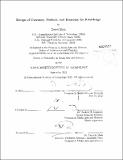Design of currency, markets, and economy for knowledge
Author(s)
Shen, Dawei
DownloadFull printable version (10.96Mb)
Other Contributors
Massachusetts Institute of Technology. Dept. of Architecture. Program in Media Arts and Sciences.
Advisor
Andrew B. Lippman.
Terms of use
Metadata
Show full item recordAbstract
Information markets benefit the communities they serve by facilitating electronic distributed exchange of information. Further benefits include enhancing knowledge sharing, innovation, and productivity. This research explores innovative market mechanisms to build longterm sustainable incentives that many existing platforms fail to provide, while encouraging pro-social behavior. A key advantage of this research is direct application of established information economic and macroeconomic theories to the design of social software and knowledge platforms. The research contribution is the design of a complete framework for information economy, which consists of several distinct components: 1) a market engine for exchanging information products that are non-rivalrous and non-excludable; 2) a serialized currency system that enables monetary acceleration; 3) "monetary policies" that ensure a healthy growth of currency supply; 4) "fiscal policies" that reward information reuse and good behavior such as tagging, voting, tipping, and fraud reporting. We built a web-based software platform called Barter, and have deployed it at several universities. Analysis of user data helps test information market effectiveness and illustrates effects of various market interventions. We present our key findings learned in the process of system deployment, such as the impacts of social connections on market interactions and fraud, effects of bounty on information quality, market fraud and intervention of fraud prevention mechanism.
Description
Thesis (Ph. D.)--Massachusetts Institute of Technology, School of Architecture and Planning, Program in Media Arts and Sciences, 2012. Cataloged from PDF version of thesis. Includes bibliographical references (p. 131-133).
Date issued
2012Department
Program in Media Arts and Sciences (Massachusetts Institute of Technology)Publisher
Massachusetts Institute of Technology
Keywords
Architecture. Program in Media Arts and Sciences.